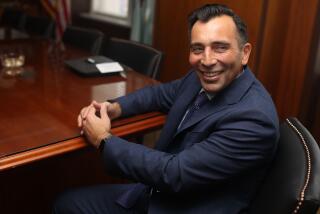Not Everyone Just Complains About Taxes : Protest: One man welcomes his day in court while taking on the Internal Revenue Service.
Like most Americans, Joe Edelson has a dream. He wants to tell the Internal Revenue Service to take its Form 1040 and shove it.
Unlike most taxpayers, however, for Edelson it’s no fantasy.
Beginning a few years back, he started filing returns that give only his name and address, protesting on the forms themselves that the IRS had no legal right to the details of his finances. In other years, he didn’t file any return. Then he invited the IRS and government lawyers to do something about it.
He was indicted in San Diego federal court last January on 11 felony counts, five charges of criminal tax evasion for the years 1984 through 1988 and six of using false Social Security numbers. If convicted on all charges, he could draw up to 55 years in prison.
Two weeks before he was indicted, however, the U.S. Supreme Court issued a ruling that gives new hope to tax protesters who want to take on the IRS. The case, a dramatic change in the law, allows protesters to show a jury that they really and truly believe they should not have to pay up.
In one of the first cases in the nation to test the new law, Edelson is set in just a few weeks to take his case to trial. He’s genuinely excited about it--and not unaware that he could be a folk hero.
“I’ve been waiting a long time for them to do this,” he said. “Everybody gets all dramatic: ‘The IRS! Indictment! Oh my God!’ Hey, I’ve been asking for this.”
He added: “I’m going to break America of the IRS. Can you see America without the IRS? It would be like being free again.”
A 62-year-old real estate salesman, Edelson walked away from his own house, his own business and the suburbs to chase his personal version of the American Dream: an April without fear and loathing for the IRS.
The car he drives now, a 13-year-old white Cadillac, is dinged, rusted and missing its right rear hubcap. The furniture in the San Carlos house he rents with his wife, Harriet, is 25 years old.
At one point, they eked out a living as farmers in Northern California. Now he’s back to the vagaries of a soft real estate market. She works at a day-care center. Together they make ends meet, though “barely,” he said, declining to provide further details.
His attorney, federal defender David Cohen, said Edelson stands a good chance of avoiding conviction due to his convictions--because, in his lifestyle changes, Edelson has put his money where his mouth is. “If anyone has a chance to win, this guy does,” Cohen said.
Prosecutors must have gotten the message. The U.S. attorney’s office in San Diego has assigned one of its top deputies, S. Gay Hugo-Martinez, to handle the trial, scheduled to begin Oct. 8.
Before moving west about seven years ago, Hugo-Martinez prosecuted organized-crime cases in Chicago.
Two years ago, in the longest-running criminal trial in the history of the San Diego federal court, she secured the tax and fraud conviction of Nancy Hoover Hunter in connection with the $80-million J. David & Co. investment swindle. This year, Hugo-Martinez has prosecuted hate crimes. In her spare time, she is a Del Mar City Council member.
Hugo-Martinez downplayed her selection: “I guess I’m modest.”
The government takes very few tax disputes to indictment, only those with which it can send a message, according to tax experts. Typically, the IRS pursues tax evaders by getting civil court orders forcing them to pay back taxes and penalties.
In 1989, the last year for which figures were available, individual taxpayers across the nation filed 110,252,723 returns, said Rebeca Villalobos, a spokeswoman for the IRS Service Center in Fresno, which processes forms from California and Hawaii.
Of those 110 million-plus returns, the IRS audited 984,643 and assessed extra taxes and penalties on 837,423 taxpayers, Villalobos said.
Only 171 people were criminally prosecuted and convicted for tax protests, she said, adding that precise numbers for San Diego were not available.
“The person who is prosecuted criminally is not going to be someone who worked an extra job and forgot to include it because of moving or something and lost the W-2,” the annual report of income supplied by an employer, Villalobos said.
Instead, it takes “something that’s real flagrant,” such as the use of different Social Security numbers or aliases or the filing of fraudulent documents, she said.
According to court papers filed by Hugo-Martinez, prosecutors know that, in 1984 and 1985, Edelson earned a decent salary. For instance, he earned $28,630 in 1984, of which $10,410 is tax that’s due, she said.
She alleged in the court filing that he evaded taxes by giving his employers fake Social Security numbers, knowing it would be those numbers that would be used to report income to the IRS. She also alleged that he tried to hide his income by depositing commission checks into his son’s bank accounts or cashing them.
On his 1984 and ’85 returns, Edelson supplied his name and a post office box for an address, claimed one exemption, scrawled the date and signed his name.
On the rest of the form, in the blocks where the IRS asked for financial information, he typed “none” or “object,” adding that “object” meant he thought the IRS was asking for numbers he thought might somehow, in some way, turn out to be incriminating.
Attached to the 1984 return was a 15-page “tirade” full of “typical tax protester gibberish,” Hugo-Martinez said.
For 1986, ’87 and ‘88, Edelson did not file any returns, Hugo-Martinez said in the court papers.
In an interview last week, Edelson said he believes the IRS asks for personal financial data in exquisite detail, asking for far more information than any other government agency demands. And no one really knows what happens to that information when it gets swallowed up in the government computers, he said.
Providing that much--and that kind of--detail compels taxpayers to give up rights guaranteed by the U.S. Constitution, he said.
In one of the most famous U.S. Supreme Court decisions of all time, the 1803 case of Marbury vs. Madison, the court held that “laws repugnant to the Constitution are null and void,” Edelson said. The rock-solid center of his beliefs, he said, is this: “You’ll find that the IRS Code is full of laws repugnant to the Constitution.”
For instance, the Fourth Amendment says the people have the right to be “secure in their persons, houses, papers and effects” from “unreasonable searches and seizures” by the government, Edelson said.
“If you come to me and ask me how much money I have in the bank, I don’t have to tell you,” Edelson said. “And neither do I have to tell the government. It’s my own private affair, nobody’s business but my own.”
The Fifth Amendment says no one can be compelled to be a witness against himself. But the IRS asks for information that could be damning in any number of contexts, he said.
“I believe wholeheartedly in what I did,” he said. “What I did was right. It’s what I’m going to continue to do, and what I’m going to encourage other people to do.”
Edelson said his battle with the IRS began about 20 years ago when he was “threatened” by an IRS official over an extension request, he said, declining to provide further details. The incident set him to wondering about the power of bureaucracies, leading him into the tax protest movement and into trouble with the law.
In 1978, when Edelson was living in the suburbs in New Jersey, he was convicted on three counts of failure to file tax returns. Three returns had been filled with broad Fifth Amendment objections.
Edelson was fined $3,000 and given a suspended one-year prison term and three years’ probation. He appealed and lost, served his probationary period and moved to California, first to the farm in Butte County and then six years ago to San Diego, where he began challenging the IRS again.
On Jan. 23, he was indicted. On Jan. 8, however, the Supreme Court handed down a new interpretation of the Tax Code, holding that a person who sincerely believes he is exempt from tax laws may not be jailed for a criminal tax violation.
Even if those beliefs are goofy or irrational, it is up to a jury to decide whether they are sincere or not, the court said in a 6-2 ruling.
The reason that matters so much is a technicality unique to the tax laws.
It’s basic that ignorance of the law is usually no defense to a criminal charge. But, because the tax codes are so frighteningly complex, Congress has said they should be treated differently: A person may be sent to prison only for a “willful”--meaning intentional--violation of the tax laws.
The Jan. 8 ruling involved an American Airlines pilot named John Cheek who stopped paying taxes in 1980 after attending an anti-tax seminar. He said he believed seminar leaders who contended that wages merely compensate employees for work performed and thus are not truly “income.”
Reversing Cheek’s conviction for tax evasion, Justice Byron R. White said for the majority that it does not matter whether the taxpayer’s belief is reasonable or not. If a jury believes a taxpayer had a “good-faith misunderstanding” about his tax obligations, he may not be found guilty of a willful tax violation.
White stressed, though, that all was hardly lost for the government. In the future, White said, prosecutors had to be given the chance to show the jury evidence that a tax protester was acting in bad faith, not good.
So, said prosecutor Hugo-Martinez, Edelson’s 1978 conviction means he should no longer be able to claim he believed, in good faith, that he had no duty to pay taxes. A jury told him he was wrong about that, she said.
Edelson said that claim misses the point. It’s got to be in good faith to persist in a belief even if it’s questioned, he said.
Besides, he added, the rules have changed since his last trial. Unlike before, the Supreme Court has guaranteed him a chance to present his views to a jury, to 12 taxpayers. Judge Judith N. Keep, the chief judge in San Diego, has been assigned the case.
In Cheek’s case, several jurors wrote notes to the judge complaining about the tax laws, according to a footnote in the Supreme Court opinion.
And, Edelson said, anyone on any jury could be the next target of an IRS investigation. He said he plans to tell jurors that, and follow it up with this: “If you want to put me in jail, so be it. If you want to make a change, use me as an example.”
More to Read
Inside the business of entertainment
The Wide Shot brings you news, analysis and insights on everything from streaming wars to production — and what it all means for the future.
You may occasionally receive promotional content from the Los Angeles Times.










